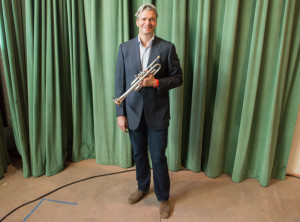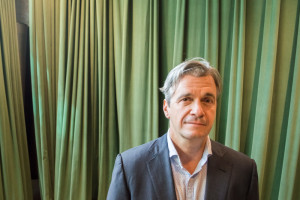Tags
Related Posts
Share This
Bill Williams

With his trumpet in hand and his desire to utilize music to travel the world, trumpet soloist and SFUAD Board of Directors member Bill Williams is rarely in one place for a long period of time. Photo by Jennifer Rapinchuk
At the root of any great learning institution lies a passionate group of educators, leaders and supporters. Santa Fe University of Art and Design’s Board of Directors is filled with professionals in multiple fields who work to maintain the best possible creative learning environment for students. Bill Williams is one of the many inspirational and qualified members, hailing from Connecticut but traveling and performing in countless places around the from San Diego to Switzerland. As a trumpeter, educator and performance consultant, he is a busy but enthusiastic addition to Santa Fe University. The school’s dedication to international exchange is especially emphasized, and Williams’ experiences abroad have given him an exposure to numerous cultures.
His lengthy list of whereabouts is impressive, and his critical awareness of the world and its art can be partially credited to that. In the past, Williams was the artistic coordinator of the YouTube Symphony Orchestra, a crowd-sourced orchestra formed by musicians from around the world who audition online. While Santa Fe is his current home, in the summers Williams spends his time in Switzerland as part of the artist faculty in the Menuhin Festival and principal trumpet in the festival orchestra. While there, he also works with performers on things like performance anxiety and stage fright. In 2011 Williams gave a TED Talk in Miami, Florida about the impact that technology has had on accessibility to music. He sat down with Jackalope Magazine to talk about his life as a musician and global art, just days before he was due to board a plane to Seoul to play with the Seoul Philharmonic.
Jackalope Magazine: What differences have you noticed in terms of culture in your travels?
Bill Williams: There are a lot of differences, even if we’re comparing and contrasting countries within Europe in terms of how they approach [an] instrument and playing a particular piece of music. But what I would say is that the conversations about music and the awareness of music, this is not a stylistic thing but kind of a general overall awareness, it’s quite different here versus continental Europe. And I can speak to the specific places I’ve lived and performed in like Switzerland, Germany, France and Spain. The kind of music that I’ve predominantly been involved with as a player is something that kind of permeates everyday awareness over there. It’s not elitist, it’s not an intellectual thing, but it’s really part of the fabric of everyday life in addition to a lot of modern music.
One example that I think is a really telling one: We had an auto mechanic in Switzerland and I bring the car into the garage for a servicing, he’s a great auto mechanic. But our conversations were around architecture, philosophy, music and he was also completely coincidentally a really fine amateur trumpet player. There’s a culture of amateurism over there that is pervasive. It’s not about being the best, the most famous, the greatest, or whatever. It’s really about doing something for the love of doing it, and there’s space and time within their lives to do other things. That’s really important.
People read newspapers—hard copies of newspapers. If you look on a train in Germany, people are reading newspapers or books. Imagine that. All of these things permeate culture.
What about differences in terms of style?
There are lots of stylistic differences too, of course. You know when you’re reading music, you’ll see a staccato or a legato marking over something; it doesn’t mean the same thing in every cultural context. And it’s also known that if you see a certain amount of notes written in a certain way, there are understood ways of playing these if you’re in Italy playing Italian comic opera or if you’re in Austria playing a Bruckner symphony. There are a lot of things that cannot be communicated on paper, so there are some pretty amazing differences within this small-ish space.

Bill Williams, a trumpet soloist and Board of Directors at Santa Fe University of Art and Design member, not only performs but also works with other musicians to explore ways to diminish stage fright and embraces the differences in music practices across a variety of cultures. Photo by Jennifer Rapinchuk
Would you say it’s important for young artists to travel?
Absolutely. And I say this very seriously: One of my dreams when I was younger was to be able to use music to travel and I continue to do that. The world is both really big and really small. And [I suggest] not just to go hit like six different cities in two weeks’ time, but to spend time in a place.
Why do you think music is so universal and has the ability to transcend language?
I mean, there are certain emotional cues, right? There are certain…I wouldn’t say universalities because I think people and cultures receive different kinds of music in different ways…I know that there are certain moves in music and certain kinds of chords that are recognized in many, if not all, cultures. You know, some cultures have microtonal music and some cultures have very different kinds of scales. But there are certainly some recognizable feelings that are generated from music that affect a lot of different people who are listening to very different music. And there are the more universal kinds of pieces of music that have been performed all over. I mean western-focused classical music is something that has been exported globally. There’s a real affinity for music in all kinds of places.
With the YouTube Symphony Orchestra, what did it feel like when everyone came together?
It was very exciting, I think for everybody. Because this is something where the people who were fortunate and who were selected for the project were coming from dozens of different countries…It was a very exciting thing, again underscoring the universality of music and the communication that can be achieved through music for sure.
Why did you decide to become a member of Santa Fe University’s Board of Directors?
SFUAD has a storied history and an extraordinary faculty. Its faculty and students are significant contributors to the vibrant cultural life of Santa Fe. And of course, the faculty and student contributions are much farther reaching than this. Santa Fe is a cosmopolitan city with deep roots in multiple cultural traditions and histories—it is recognized globally as a center of arts and culture. It is an honor for me to have the opportunity to do what I can to contribute my experience, insight and unique perspectives to help SFUAD to thrive and to continue to evolve as an institution.
Do you have any advice for a music student who would also want to use music to travel?
Continue to ruthlessly hone your craft and your art form. Continue to work on that, give it your all. As you’re doing that, be open both to possibilities that emerge, and also look for people whom you admire, potential mentors, people whose work you admire. If you can, reach out to them, talk to them. Something that I started doing a long time ago was that. And something that I’ve always been amazed by is the generosity of people who are doing really incredible work in whatever space. If they have the time, more often than not, people who are doing things at an extraordinary level are very generous with sharing their ideas, giving you feedback and things like that. I think that’s another big piece of the puzzle that we don’t necessarily think about a lot.
This interview has been edited for style and clarity.






 Jackalope Magazine is the student magazine of Santa Fe University of Art and Design. Building on the interdisciplinary nature of our education, we aim to showcase the talent of our university and character of our city.
Jackalope Magazine is the student magazine of Santa Fe University of Art and Design. Building on the interdisciplinary nature of our education, we aim to showcase the talent of our university and character of our city.
Recent Comments